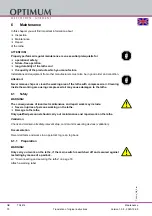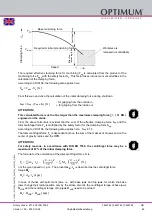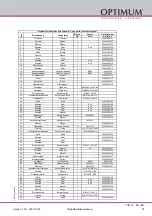
Version 1.0.5 - 2020-12-09
82
Translation of original operating manual
Coolant lubricating
EN
co
olant
_G
B.
fm
6.6
Cooling lubricants and tanks
CAUTION!
The cooling lubricant can cause diseases. Avoid direct contact with cooling lubricant or
parts covered in cooling lubricant.
Cooling lubricant circuits and tanks for water-cooling lubricant mixtures must be completely
emptied, cleaned and disinfected as needed, but at least once per year or every time the coo-
ling lubricant is replaced.
If fine chips and other foreign matters are accumulated in the coolant tank, the machine can no
longer be correctly supplied with coolant. Furthermore, the lifetime of the coolant pump is
reduced.
When processing cast iron or similar materials generating fine chips, cleaning the coolant tank
more often is recommended.
Limit values
The cooling lubricant must be replaced, the cooling lubricant circuit and tank emptied,
cleaned and disinfected if
the pH value drops by more than 1 based on the value during initial filling. The maximum
permissible pH value during initial filing is 9.3
there is a perceivable change in the appearance, odour, floating oil or increase of the bacte-
ria to more than 10/6/ml
there is an increase in nitrite content to more than 20 ppm (mg/1) or nitrate content to more
than 50 ppm (mg/1)
there is an increase in the N-nitrosodiethanolamine (NDELA) to more than 5 ppm (mg/a)
CAUTION!
Comply with the manufacturer's specifications for mixture ratios, hazardous substances,
e.g. system cleaners, including their permissible minimum use times.
CAUTION!
Since the cooling lubricant escapes under high pressure, pumping out the coolant by
using the existing cooling lubricant pump via a pressure hose into a suitable tank is not
recommended.
ENVIRONMENTAL PROTECTION
During work on the cooling lubricant equipment please make sure that
collector tanks are used with sufficient capacity for the amount of liquid to be col-
lected.
liquids and oils should not be spilled on the ground.
Clean up any spilled liquid or oils immediately using proper oil-absorption methods and dis-
pose of them in accordance with current statutory environmental regulations.
Collect leakages
Do not re-introduce liquids spilled outside the system during repair or as a result of leakage
from the reserve tank, instead collect them in a collecting container for disposal.
Disposal
Never dump oil or other substances which are harmful to the environment into water inlets,
rivers or channels. Used oils must be delivered to a collection centre. Consult your supervisor if
you do not know where the collection centre is.










































